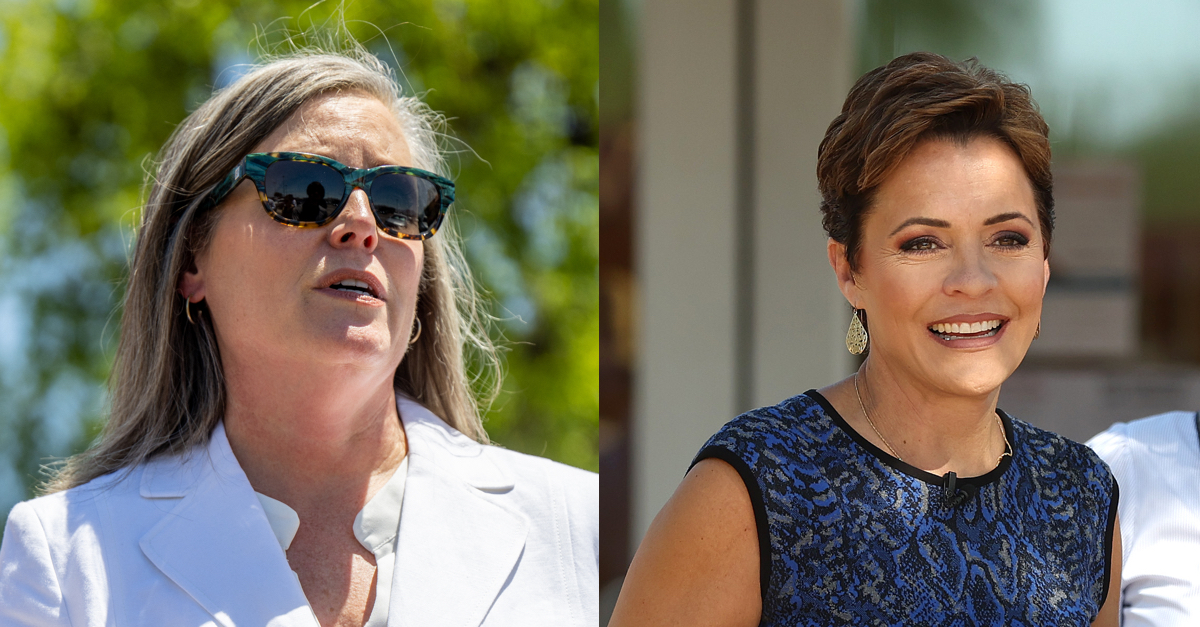
Left: Arizona Secretary of State Katie Hobbs (D) speaks to reporters at a news conference on Aug. 2, 2022 (photo by Brandon Bell/Getty Images). Right: Kari Lake (R) leaves a polling place after voting in the Arizona primary on Aug. 2, 2022 (photo by Justin Sullivan/Getty Images).
A federal judge in Arizona has dismissed a case brought by two GOP candidates vying for the state’s top leadership positions, finding their claims of potential voter fraud “conjectural allegations of potential injuries.”
Kari Lake (R) sued Secretary of State Katie Hobbs (D) in April, alleging that the electronic voting machines used in state elections were at risk of hacking, election tampering, and voter fraud. State lawmaker Mark Finchem, the GOP candidate for Secretary of State, joined Lake in the case, which also named members Board of Supervisors for Maricopa and Pima counties.
The Republicans wanted an injunction barring the use of electronic voting machines in the upcoming November election, when Lake and Hobbs will face each other in the state’s gubernatorial race.
Lake has been a strong amplifier of Donald Trump’s claim that the 2020 presidential election was stolen by Joe Biden, despite dozens of lawsuits and multiple audits finding that widespread, election outcome-altering fraud did not take place, and despite cybersecurity officials determining that the 2020 race was the most secure election in U.S. history.
U.S. District Judge John J. Tuchi issued the ruling dismissing the complaint on Friday.
He found that Lake and Finchem lacked standing to sue, a threshold issue in any case. Noting that a plaintiff is required to state an injury in fact — and not one that is “conjectural or hypothetical” — Tuchi found that Lake and Finchem failed to meet that standard.
Tuchi, a Barack Obama appointee, says that “a long chain of hypothetical contingencies must take place for any harm to occur” to Lake that would allow her to sue.
Those hypotheticals, according to Tuchi:
(1) the specific voting equipment used in Arizona must have “security failures” that allow a malicious actor to manipulate vote totals;
(2) such an actor must actually manipulate an election;
(3) Arizona’s specific procedural safeguards must fail to detect the manipulation; and
(4) the manipulation must change the outcome of the election.
“Plaintiffs fail to plausibly show that Arizona’s voting equipment even has such security failures,” Tuchi writes. “And even if the allegations in Plaintiff’s complaint were plausible, their alleged injury is not ‘certainly impending’ as required by [legal precedent].”
Tuchi also agreed with Hobbs’ argument that the lawsuit is barred under the Eleventh Amendment, which prohibits individuals from suing states in federal court. Lake had argued that Arizona’s method of voting “must produce a reliable count of the votes,” and, according to Lake, “Arizona’s equipment and system do not.”
Tuchi said that he “finds this line of argument unpersuasive.”
“Because the Constitution charges states with administering elections, Plaintiffs’ claims can only stem from an argument that Defendants are violating state law by using what Plaintiffs allege are insecure or inaccurate voting systems,” Tuchi wrote. “Plaintiffs argued at the hearing in this matter that their claims do not depend on any application of Arizona state law, and the Court need not determine whether Defendants’ procedures comply with state law to grant Plaintiffs relief, but as set forth above, they are incorrect. Indeed, Arizona state laws set forth detailed requirements concerning how ballots are counted and how voting systems are used.”
In a footnote, Tuchi also had sharp words for Lake’s allegations about the use of paper ballots in the state.
“In any event, insofar as Plaintiffs argue a constitutional violation grounded in Arizona’s failure to require voting by paper ballots, their allegations are flatly wrong,” Tuchi wrote. “The Court finds for purposes of determining jurisdiction, that as set forth supra, 99.98% of voters in Arizona cast their votes by marking and submitting paper ballots in the 2020 election, and the remaining 0.02% — representing mostly sight impaired voters — cast their ballots on system-generated paper ballots which could be verified before casting to ensure they reflected those voters’ choices.”
Tuchi also said that Lake’s lawsuit is untimely, noting that the plaintiffs requested “a complete overhaul of Arizona’s election procedures” ahead of the November midterm elections.
“The injunctive relief Plaintiffs seek would not just be challenging for Arizona’s election officials to implement; it likely would be impossible under the extant time constraints,” Tuchi added.
Tuchi then dismissed Lake’s claim “in its entirety.”
“While the Court agrees with Plaintiffs that the right to vote is precious, and should be protected, Plaintiffs lack standing because they have articulated only conjectural allegations of potential injuries that are in any event barred by the Eleventh Amendment, and seek relief that the Court cannot grant[,]” Tuchi wrote.
Hobbs celebrated the ruling as a victory for Arizona voters.
“Another win for Arizona’s elections,” Hobbs said on Twitter when the ruling was issued. “Voters can have confidence that their vote counts and that Arizona’s procedures are accurate and secure- this lawsuit merely perpetuated false information about elections administration.”
Another win for Arizona’s elections. Voters can have confidence that their vote counts and that Arizona’s procedures are accurate and secure- this lawsuit merely perpetuated false information about elections administration. pic.twitter.com/iI5MGYiAu1
— Secretary Katie Hobbs (@SecretaryHobbs) August 26, 2022
Read the judge’s ruling:
[Photo of Katie Hobbs by Brandon Bell/Getty Images. Photo of Kari Lake by Justin Sullivan/Getty Images.]
Have a tip we should know? [email protected]